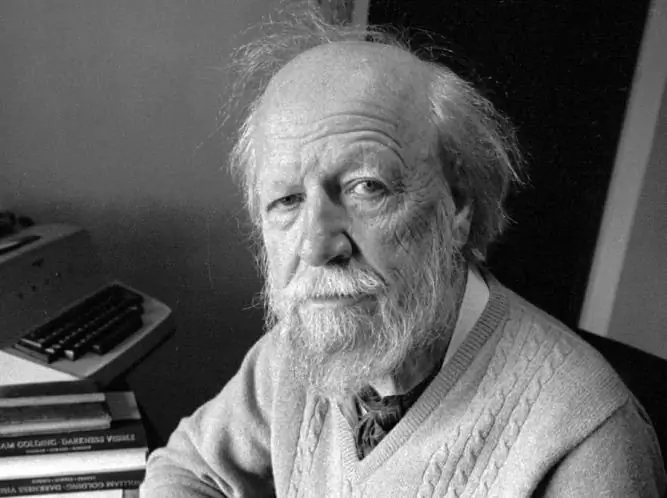- Author Antonio Harrison harrison@cultureoeuvre.com.
- Public 2023-12-16 07:44.
- Last modified 2025-01-22 21:44.
The prose works of William Golding became a prominent phenomenon in world literature in the second half of the last century. The author subordinated his books to a single ideological concept. The writer was very worried about the fate of man in the modern world. What is the essence of man? What are good and evil? It is these questions that Golding tries to reveal in his novels.

From the biography of William Golding
William Gerald Golding was born on September 19, 1911 in England, in Cornwall. His father was a school teacher. From a young age, Golding developed an interest in antiquity. He was especially interested in primitive society. After graduating from college at Oxford University, where William studied science for two years, he specialized in English language and literature. Subsequently, Golding began teaching philosophy and English at Salisbury.
When World War II broke out, Golding went to serve in the navy. As commander of a landing ship, he took part in the landing of the Allied forces in Normandy.
William Golding was married. His wife Anne (nee Brookfield) was a chemist by profession. After the wedding, which took place in 1939, the couple moved to Salisbury, where in 1940 their first child was born - their son David. Golding's daughter, Judith, was born in 1945.
After the end of the war, the future writer left the army. He continued to teach. At the same time, William wrote articles and reviews for numerous magazines. During the same period, William is working hard on his first novels, which he could not publish. In 1952, Golding began to diligently work on the book that would later make him famous.
Golding's creative path
The first title of the work - "Strangers from the Inside" - did not make an impression on the publishers: the author received two dozen refusals. Only in 1954 the book was published, but already under the title "Lord of the Flies." This literary work quickly became a bestseller. This book, which was about a group of teenagers who found themselves on a lost island during the war, was read throughout Great Britain. As a result, Golding's merits were appreciated: he was elected a member of the Royal Society of Literature.
This book was followed by other works. Over the course of four decades, Golding created 12 novels. His favorite work was The Heirs (1955), where the author developed the issue of morality and vice, raised in his first book. In 1956, the novel "Martin the Thief" was published. It told about the difficult fate of a naval officer who became a victim of a shipwreck. All three of Golding's best books are united by one idea - the struggle of man for survival.
In 1959, Golding presented his novel Free Fall to the reading public. The author shared with the readers his thoughts on the responsibility of each person for their actions and on the meaning of human existence.
The success in the field of literature inspired the writer. In 1962, he retired from teaching and completely immersed himself in creativity. In 1964, the novel The Spire was published. After that, Golding turned to small genres. He publishes collections of stories and short stories: The Pyramid (1967) and The Scorpion God (1971). Then there was a pause in creativity. In 1979, Golding returned to the reader, presenting the public with the novel Visible Darkness. The author reveals his vision of the problem of good and evil. The writer makes the well-fed life of a technocratic society an object of criticism.
In the 80s, Golding creates several more significant works. The English writer did not have time to finish his last book, Double Language. He passed away in June 1993. Golding's last book was meticulously restored from sketches preserved in the archives and published in 1995.






